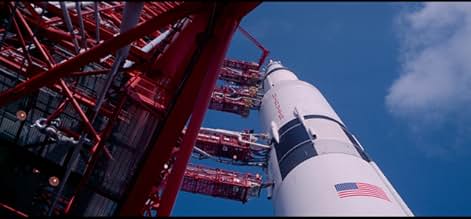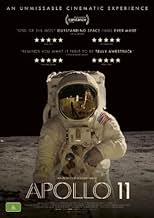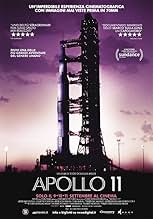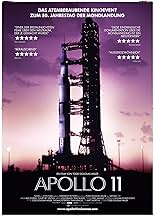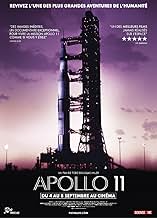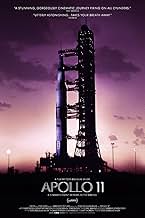IMDb रेटिंग
8.1/10
28 हज़ार
आपकी रेटिंग
कमांडर नील आर्मस्ट्रांग और पायलट बज़ एल्ड्रिन और माइकल कॉलिन्स के नेतृत्व में चंद्रमा पर उतरने के लिए अपोलो 11 मिशन को दर्शाया गया है.कमांडर नील आर्मस्ट्रांग और पायलट बज़ एल्ड्रिन और माइकल कॉलिन्स के नेतृत्व में चंद्रमा पर उतरने के लिए अपोलो 11 मिशन को दर्शाया गया है.कमांडर नील आर्मस्ट्रांग और पायलट बज़ एल्ड्रिन और माइकल कॉलिन्स के नेतृत्व में चंद्रमा पर उतरने के लिए अपोलो 11 मिशन को दर्शाया गया है.
- 3 प्राइमटाइम एमी जीते
- 59 जीत और कुल 44 नामांकन
Neil Armstrong
- Self - Mission Commander
- (आर्काइव फ़ूटेज)
Mike Collins
- Self - Command Module Pilot
- (आर्काइव फ़ूटेज)
Buzz Aldrin
- Self - Lunar Module Pilot
- (आर्काइव फ़ूटेज)
- (as Edwin 'Buzz' Aldrin)
Deke Slayton
- Self - Director of Flight Crew Operations
- (आर्काइव फ़ूटेज)
Clifford E. Charlesworth
- Self - Flight Director Green Team
- (आर्काइव फ़ूटेज)
Bruce McCandless II
- Self - Capsule Commuicator (CAPCOM) Green Team
- (आर्काइव फ़ूटेज)
- (as Bruce McCandless)
Charles Duke
- Self - Capsule Communicator (CAPCOM) White Team
- (आर्काइव फ़ूटेज)
Gene Kranz
- Self - Flight Director White Team
- (आर्काइव फ़ूटेज)
Jim Lovell
- Self - Backup Commander
- (आर्काइव फ़ूटेज)
John F. Kennedy
- Self - President of the United States of America
- (आर्काइव फ़ूटेज)
Janet Armstrong
- Self
- (आर्काइव फ़ूटेज)
Patricia Mary Finnegan
- Self
- (आर्काइव फ़ूटेज)
Andy Aldrin
- Self
- (आर्काइव फ़ूटेज)
Joan Ann Archer
- Self
- (आर्काइव फ़ूटेज)
- (बिना क्रेडिट के)
Walter Cronkite
- Self
- (आर्काइव फ़ूटेज)
- (बिना क्रेडिट के)
Lyndon B. Johnson
- Self
- (आर्काइव फ़ूटेज)
- (बिना क्रेडिट के)
फ़ीचर्ड समीक्षाएं
"Apollo 11" (2019 release; 93 min.) is a documentary about the Apollo 11 mission. As the movie opens, we are informed it is "July 16, 1969" and a mere 3 hours away from the launch. We get full-color footage of the enormous crowds 15 mi. away from the launching pad. Meanwhile, through a quick photo montage, we get a quick glimpse at the three astronauts' life, as they are getting their space suits on. The TV commentator meanwhile talks about "the burdens and hope they carry for all mankind". It is then time for the astronauts to be driven to the Apollo. At this point we are then 10 min. into the movie.
Couple of comments: this documentary is directed and edited by Todd Douglas Miller. There have been many documentaries about the Apollo 11 mission before, so what sets this one apart? Several things: first and foremost, during the collaboration between the film makers and NASA, never before seen 70 mm full color footage was unearthed. That, combined with previously available 16 mm and 32 mm footage allowed the film makers to present this story in a way never before experienced. Frankly, words are not enough. The astronauts' elevator ride up to the top of the Apollo space ship (over 300 ft. tall) finally give a sense of how freaking high that is. Second, the film makers decided to use no voice-over or narrator, and instead let the TV commentary and the internal NASA discussions do all of the talking. Third, there is a fabulous electronic score, courtesy of composer Matt Morton. And get this: Morton used only instruments that were around at the time of Apollo 11's trip to the moon in July, 1969, including including the Moog modular Synthesizer IIIc, the Binson Echorec 2, and the Mellotron. Wow, just wow. When you combine all of these elements, it makes for outright compelling viewing. Even though we of course know the outcome, I nevertheless STILL felt tense as I was watching all of this unfold.
You may or may not be aware that Neil Armstrong spent the last 40 years of his life here in Cincinnati (where I live), including teaching at the University of Cincinnati. Upon his retirement, he became an even more private person than he already was, and public appearances were rare. I had the great fortune of seeing him narrate the "Lincoln Portrait" at a Cincinnati Pops performance in 2009, and the outpouring of love, respect and affection from the public for this true American hero made the hairs stand on my arms. Meanwhile, "Apollo 11" is an unforgettable movie experience, and highly recommended!
*UPDATE Jan 13, 2020* This past weekend I saw an edited version of the film called "Apollo 11 - First Steps Edition" at the Omnimax theater of the Cincinnati Museum Center. It is the exact same footage as in the original film, cut down to 45 min. so as to fit the IMAX/Omnimax schedules. I was incredibly excited beforehand, as I thought this would be true Imax/Omnimax footage, but alas, that is not the case. It's as before but projected on the half-dome screen that is the Omnimax. Still very enjoyable, and I love, LOVE the original score by Matt Morton blasting away in an Omnimax setting.
Couple of comments: this documentary is directed and edited by Todd Douglas Miller. There have been many documentaries about the Apollo 11 mission before, so what sets this one apart? Several things: first and foremost, during the collaboration between the film makers and NASA, never before seen 70 mm full color footage was unearthed. That, combined with previously available 16 mm and 32 mm footage allowed the film makers to present this story in a way never before experienced. Frankly, words are not enough. The astronauts' elevator ride up to the top of the Apollo space ship (over 300 ft. tall) finally give a sense of how freaking high that is. Second, the film makers decided to use no voice-over or narrator, and instead let the TV commentary and the internal NASA discussions do all of the talking. Third, there is a fabulous electronic score, courtesy of composer Matt Morton. And get this: Morton used only instruments that were around at the time of Apollo 11's trip to the moon in July, 1969, including including the Moog modular Synthesizer IIIc, the Binson Echorec 2, and the Mellotron. Wow, just wow. When you combine all of these elements, it makes for outright compelling viewing. Even though we of course know the outcome, I nevertheless STILL felt tense as I was watching all of this unfold.
You may or may not be aware that Neil Armstrong spent the last 40 years of his life here in Cincinnati (where I live), including teaching at the University of Cincinnati. Upon his retirement, he became an even more private person than he already was, and public appearances were rare. I had the great fortune of seeing him narrate the "Lincoln Portrait" at a Cincinnati Pops performance in 2009, and the outpouring of love, respect and affection from the public for this true American hero made the hairs stand on my arms. Meanwhile, "Apollo 11" is an unforgettable movie experience, and highly recommended!
*UPDATE Jan 13, 2020* This past weekend I saw an edited version of the film called "Apollo 11 - First Steps Edition" at the Omnimax theater of the Cincinnati Museum Center. It is the exact same footage as in the original film, cut down to 45 min. so as to fit the IMAX/Omnimax schedules. I was incredibly excited beforehand, as I thought this would be true Imax/Omnimax footage, but alas, that is not the case. It's as before but projected on the half-dome screen that is the Omnimax. Still very enjoyable, and I love, LOVE the original score by Matt Morton blasting away in an Omnimax setting.
The film starts the morning of launch day July 16, 1969. There are no actors, no reenactments, no narrator. It is 100% restored archival footage and recorded audio, most of which I had never seen before. Opening footage of the crowds gathering around Kennedy Space Center gave you the sense it was apparent to everyone the magnitude of what was about to happen.
They had audio and video of (an issue I won't spoil, something during launch prep I had never heard of before). Obviously there is no external footage of the spacecraft from the time it leaves earth orbit until it arrived at the moon but the editing and coverage used are excellent and you never feel like you're in the dark or missing out.
There is no attempt made at politicizing the event or manipulating the viewer, it is raw, factual cinéma vérité. Although I did find Kennedy's speech moving, they made the excellent choice to NOT show the famous portion we've all heard about landing a man on the moon and returning him safely by the end of the decade. It was the rest of that speech, which I'm not sure I'd ever heard, that was astute, prophetic and even funny at one point.
My one very minor caution is that viewers who aren't already aware how critical/dangerous some maneuvers were could miss out on the gravity of the situation. The filmmakers do assist with this with the score, which is absolutely fantastic (and according to the credits, composed entirely with instruments available in July '69), and some minor on-screen graphics (e.g. FUEL 30 seconds, 1202 alarm). It's a trivial concern but viewers who are familiar with the space program in general, and this mission in particular, will get the most out of the experience.
The film wraps up after our astronauts are safely home and cleared from quarantine. During the credits there are a few more interesting shots of some of the celebrations.
They had audio and video of (an issue I won't spoil, something during launch prep I had never heard of before). Obviously there is no external footage of the spacecraft from the time it leaves earth orbit until it arrived at the moon but the editing and coverage used are excellent and you never feel like you're in the dark or missing out.
There is no attempt made at politicizing the event or manipulating the viewer, it is raw, factual cinéma vérité. Although I did find Kennedy's speech moving, they made the excellent choice to NOT show the famous portion we've all heard about landing a man on the moon and returning him safely by the end of the decade. It was the rest of that speech, which I'm not sure I'd ever heard, that was astute, prophetic and even funny at one point.
My one very minor caution is that viewers who aren't already aware how critical/dangerous some maneuvers were could miss out on the gravity of the situation. The filmmakers do assist with this with the score, which is absolutely fantastic (and according to the credits, composed entirely with instruments available in July '69), and some minor on-screen graphics (e.g. FUEL 30 seconds, 1202 alarm). It's a trivial concern but viewers who are familiar with the space program in general, and this mission in particular, will get the most out of the experience.
The film wraps up after our astronauts are safely home and cleared from quarantine. During the credits there are a few more interesting shots of some of the celebrations.
A half-century ago, Neil Armstrong stepped off the ladder of the Lunar Module Eagle and into the history books. In the decades since, that moment and the flights of NASA's Apollo program have been chronicled in seemingly countless documentaries. At the top of that list remains 1989's For All Mankind from the late Al Reinert and 2007's In The Shadow Of The Moon from British filmmakers David Sington and Christopher Riley. Up there with them now is 2019's Apollo 11, an exciting new film from Todd Douglas Miller that is begging for you to see it on the biggest screen possible.
Why?
In part because of Miller who, like those other great filmmakers of Apollo before him, wasn't content to merely do a rehash of what had come before. Miller's Apollo 11 is in part a deep dive into the NASA archives, uncovering things that even the most seasoned space enthusiast has likely never seen before. There's a wealth of pre-launch footage, for example, tracing the preparations from the rollout of the massive Saturn V rocket to the launch pad to multiple perspectives of the launch itself. Even when events move into space, there's still a wealth of rare material to experience including conversations between the astronauts themselves as well as between them and Mission Control in Houston. Even where footage that has become synonymous with the mission and the era such as the stage separations of the rocket or the Lunar Module's descent to the surface of the Moon, it's presented with clarity and scale rarely seen elsewhere. For that alone, the film renders excellent service.
It does so in other ways, as well. Unlike those two documentaries I mentioned at the top of this review, Miller doesn't use astronaut interviews (either aural or visual) to help tell the story. Instead, Apollo 11 unfolds entirely through archival sources ranging from the transmissions to the voice of NASA's public affairs or well-known TV commentators like Walter Cronkite. To help aid visually for parts of the mission where there isn't much or anything to show, the film employees simple animation alongside such commentaries. The film also makes effective use of split-screen and captions to portray mission control or to show events such as the actual walk on the Moon from multiple perspectives. As much as the footage itself on a cinema screen does, it presents the sheer scale of the endeavor but without losing the viewer in the technicalities involved in spaceflight.
In some ways, that's the greatest triumph of Apollo 11 the documentary. It's a film keen to present Apollo 11 the mission in awe-inspiring yet understandable terms, one that emphasizes how incredible in scope and achievement that flight five decades ago this July was. It's also a reminder, at a time when cinema screens find themselves increasingly dominated by would-be blockbusters and superhero flicks, of the raw power of cinema to present stories. Both of those are things we need reminding of, it seems, and the film does a superb job of both.
Why?
In part because of Miller who, like those other great filmmakers of Apollo before him, wasn't content to merely do a rehash of what had come before. Miller's Apollo 11 is in part a deep dive into the NASA archives, uncovering things that even the most seasoned space enthusiast has likely never seen before. There's a wealth of pre-launch footage, for example, tracing the preparations from the rollout of the massive Saturn V rocket to the launch pad to multiple perspectives of the launch itself. Even when events move into space, there's still a wealth of rare material to experience including conversations between the astronauts themselves as well as between them and Mission Control in Houston. Even where footage that has become synonymous with the mission and the era such as the stage separations of the rocket or the Lunar Module's descent to the surface of the Moon, it's presented with clarity and scale rarely seen elsewhere. For that alone, the film renders excellent service.
It does so in other ways, as well. Unlike those two documentaries I mentioned at the top of this review, Miller doesn't use astronaut interviews (either aural or visual) to help tell the story. Instead, Apollo 11 unfolds entirely through archival sources ranging from the transmissions to the voice of NASA's public affairs or well-known TV commentators like Walter Cronkite. To help aid visually for parts of the mission where there isn't much or anything to show, the film employees simple animation alongside such commentaries. The film also makes effective use of split-screen and captions to portray mission control or to show events such as the actual walk on the Moon from multiple perspectives. As much as the footage itself on a cinema screen does, it presents the sheer scale of the endeavor but without losing the viewer in the technicalities involved in spaceflight.
In some ways, that's the greatest triumph of Apollo 11 the documentary. It's a film keen to present Apollo 11 the mission in awe-inspiring yet understandable terms, one that emphasizes how incredible in scope and achievement that flight five decades ago this July was. It's also a reminder, at a time when cinema screens find themselves increasingly dominated by would-be blockbusters and superhero flicks, of the raw power of cinema to present stories. Both of those are things we need reminding of, it seems, and the film does a superb job of both.
"I didn't feel like a giant. I felt very, very small." Neil Armstrong looking on earth from the moon.
If somehow you missed Apollo 11's flight to the moon in 1969 (indeed you might not have been born yet), fear not: The perfect documentary about those three real superheroes is here. The titular doc stars Neil Armstrong, Buzz Aldrin, and Michael Collins in nail biting suspense and no explosions save rocket propulsion.
The only part not of the original footage is the original synth drones' soundtrack by an inspired Matt Morton. The percussive beat has pomp like that of a thriller in which the president has a fleet of black SUV's rolling to its heart-beating energy, supporting a blockbuster that this time is for real.
Notwithstanding the deeply introspective First Man, starring Ryan Gosling as Armstrong, the real Armstrong comes through in this doc. As expected, he's like the straight arrow he is alleged to be-good guy, slightly nerdy, smart, evident even with as little face time as he has here.
Maybe that's the point: Without the sophisticated computers we have 50 years later, these astronauts and technicians work hard long hours together, no claims to glory, profit, or party loyalty. Their collaboration is worthy of any Marvel voyage; only it's real.
New images and sounds emerge despite the decades of depicting this event in multi-media. Some NASA shots have never been seen before. Although the images may not be as spectacular as the ones we've grown accustomed to, they represent the constantly renewable glory of mankind at its technological best, devoid of petty ego embellishments and full of human connections.
You'll find more dramatic renditions of this adventure, but you'll never find 93 minutes more perfectly capturing the grandeur of science and humanity working together to realize the impossible. This right stuff is right here in a grand documentary called, very simply, Apollo 11.
If somehow you missed Apollo 11's flight to the moon in 1969 (indeed you might not have been born yet), fear not: The perfect documentary about those three real superheroes is here. The titular doc stars Neil Armstrong, Buzz Aldrin, and Michael Collins in nail biting suspense and no explosions save rocket propulsion.
The only part not of the original footage is the original synth drones' soundtrack by an inspired Matt Morton. The percussive beat has pomp like that of a thriller in which the president has a fleet of black SUV's rolling to its heart-beating energy, supporting a blockbuster that this time is for real.
Notwithstanding the deeply introspective First Man, starring Ryan Gosling as Armstrong, the real Armstrong comes through in this doc. As expected, he's like the straight arrow he is alleged to be-good guy, slightly nerdy, smart, evident even with as little face time as he has here.
Maybe that's the point: Without the sophisticated computers we have 50 years later, these astronauts and technicians work hard long hours together, no claims to glory, profit, or party loyalty. Their collaboration is worthy of any Marvel voyage; only it's real.
New images and sounds emerge despite the decades of depicting this event in multi-media. Some NASA shots have never been seen before. Although the images may not be as spectacular as the ones we've grown accustomed to, they represent the constantly renewable glory of mankind at its technological best, devoid of petty ego embellishments and full of human connections.
You'll find more dramatic renditions of this adventure, but you'll never find 93 minutes more perfectly capturing the grandeur of science and humanity working together to realize the impossible. This right stuff is right here in a grand documentary called, very simply, Apollo 11.
Todd Douglas Miller's documentary Apollo 11 is a rich buffet of restored footage, clever image juxtaposition, and ingenious lip reading. There is SO MUCH newly-released footage, one gets the impression that 1/4 of the mission weight must've been cameras and film! Where have these images been for fifty years? There's no narration... just sounds and voices from the mission, peppered with occasional contemporaneous commentary from Walter Cronkite's legendary broadcasts. The film is a beautiful, visceral thrill ride, lovingly constructed, without aggrandizement... yet emotions soar. This is what America once was, and what it could be again, and I absolutely do not mean that in any jingoistic sense. Truly our finest moment. See it in IMAX if you can - IT IS WORTH IT.
क्या आपको पता है
- ट्रिवियाSeveral of the recordings captured by the astronauts during the mission are featured in this documentary. These recordings by Neil Armstrong, Buzz Aldrin and Mike Collins earned them honorary memberships in the American Society of Cinematographers.
- गूफ़The incident involving Buzz Aldrin's bio-med sensors going out, leading him to crack wise, saying, "I promise I will let you know if I stop breathing," occurred during the return voyage, on day 8 of the mission, but is depicted (at approx 48 minutes into the film) as happening during the approach to the moon before the separation of the command and lunar modules.
- भाव
Neil Armstrong: One small step for man... one giant leap for mankind.
- इसके अलावा अन्य वर्जनIn 2019, an edited version of the film, cut down to 45 minutes for exhibition in museum IMAX theaters, was released as Apollo 11: First Steps.
- कनेक्शनFeatured in WatchMojo: Top 10 Best Movies of 2019 (So Far) (2019)
- साउंडट्रैकMother Country
Written and Performed by John Stewart
टॉप पसंद
रेटिंग देने के लिए साइन-इन करें और वैयक्तिकृत सुझावों के लिए वॉचलिस्ट करें
विवरण
- रिलीज़ की तारीख़
- कंट्री ऑफ़ ओरिजिन
- आधिकारिक साइटें
- भाषा
- इस रूप में भी जाना जाता है
- Apollo 11: First Steps
- फ़िल्माने की जगहें
- Sea of Tranquility, The Moon, Space(Apollo 11 landing site)
- उत्पादन कंपनियां
- IMDbPro पर और कंपनी क्रेडिट देखें
बॉक्स ऑफ़िस
- US और कनाडा में सकल
- $90,39,891
- US और कनाडा में पहले सप्ताह में कुल कमाई
- $16,07,040
- 3 मार्च 2019
- दुनिया भर में सकल
- $1,53,43,649
- चलने की अवधि
- 1 घं 33 मि(93 min)
- रंग
- ध्वनि मिश्रण
- पक्ष अनुपात
- 2.20 : 1
इस पेज में योगदान दें
किसी बदलाव का सुझाव दें या अनुपलब्ध कॉन्टेंट जोड़ें






